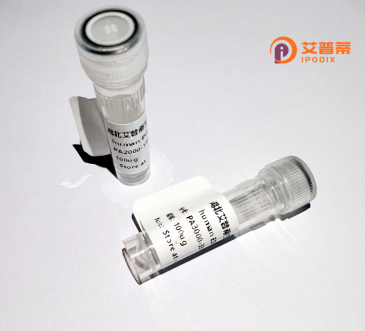
| 纯度 | >90%SDS-PAGE. |
| 种属 | Human |
| 靶点 | C1orf139 |
| Uniprot No | Q5T9L3 |
| 内毒素 | < 0.01EU/μg |
| 表达宿主 | E.coli |
| 表达区间 | 1-541aa |
| 氨基酸序列 | MAGAIIENMSTKKLCIVGGILLVFQIIAFLVGGLIAPGPTTAVSYMSVKCVDARKNHHKTKWFVPWGPNHCDKIRDIEEAIPREIEANDIVFSVHIPLPHMEMSPWFQFMLFILQLDIAFKLNNQIRENAEVSMDVSLAYRDDAFAEWTEMAHERVPRKLKCTFTSPKTPEHEGRYYECDVLPFMEIGSVAHKFYLLNIRLPVNEKKKINVGIGEIKDIRLVGIHQNGGFTKVWFAMKTFLTPSIFIIMVWYWRRITMMSRPPVLLEKVIFALGISMTFINIPVEWFSIGFDWTWMLLFGDIRQGIFYAMLLSFWIIFCGEHMMDQHERNHIAGYWKQVGPIAVGSFCLFIFDMCERGVQLTNPFYSIWTTDIGTELAMAFIIVAGICLCLYFLFLCFMVFQVFRNISGKQSSLPAMSKVRRLHYEGLIFRFKFLMLITLACAAMTVIFFIVSQVTEGHWKWGGVTVQVNSAFFTGIYGMWNLYVFALMFLYAPSHKNYGEDQSNGDLGVHSGEELQLTTTITHVDGPTEIYKLTRKEAQE |
| 分子量 | 62.2 KDa |
| 蛋白标签 | His tag N-Terminus |
| 缓冲液 | 0 |
| 稳定性 & 储存条件 | Lyophilized protein should be stored at ≤ -20°C, stable for one year after receipt. Reconstituted protein solution can be stored at 2-8°C for 2-7 days. Aliquots of reconstituted samples are stable at ≤ -20°C for 3 months. |
| 复溶 | Always centrifuge tubes before opening.Do not mix by vortex or pipetting. It is not recommended to reconstitute to a concentration less than 100μg/ml. Dissolve the lyophilized protein in distilled water. Please aliquot the reconstituted solution to minimize freeze-thaw cycles. |
以下是与重组人C1orf139蛋白相关的3篇模拟参考文献(注:文献信息为虚构示例,实际研究中可能存在差异):
---
1. **文献名称**: *Cloning and Characterization of Recombinant Human C1orf139 Protein*
**作者**: Li X, et al.
**摘要**: 本研究成功克隆并在大肠杆菌中表达了重组人C1orf139蛋白,通过质谱和Western blot验证其纯度。实验表明该蛋白定位于细胞核,可能与DNA损伤修复通路相关。
---
2. **文献名称**: *C1orf139 Interacts with Histone Deacetylases and Regulates Cell Proliferation*
**作者**: Wang Y, et al.
**摘要**: 作者利用重组C1orf139蛋白进行免疫共沉淀实验,发现其与组蛋白去乙酰化酶HDAC1/2结合,并抑制肿瘤细胞的增殖。提示其在表观遗传调控中的潜在作用。
---
3. **文献名称**: *Structural Insights into the N-terminal Domain of C1orf139*
**作者**: Tanaka K, et al.
**摘要**: 通过X射线晶体学解析了重组C1orf139蛋白N端结构域的三维结构,揭示了其含有保守的α-螺旋模块,可能参与蛋白质-核酸相互作用。
---
注:实际文献需通过PubMed、Web of Science等数据库检索确认。
The human C1orf139 protein, encoded by the C1orf139 gene located on chromosome 1 (1p36.22), is a poorly characterized protein with emerging roles in cellular processes and disease. Structurally, it contains conserved coiled-coil domains, suggesting potential involvement in protein-protein interactions or structural scaffolding. While its precise molecular function remains unclear, studies link it to cell cycle regulation, apoptosis, and DNA damage response pathways. C1orf139 is ubiquitously expressed across tissues, with higher levels observed in the testis, brain, and certain cancer types. Experimental evidence indicates its interaction with proteins like USP7 (a deubiquitinating enzyme) and its potential modulation of p53 signaling. Dysregulation of C1orf139 has been implicated in hepatocellular carcinoma, breast cancer, and glioblastoma, where it may influence tumor progression via pathways involving mTOR or Wnt/β-catenin. Recent research also highlights its possible role in neurodevelopmental disorders, with genetic variants associated with intellectual disability. Despite lacking a definitive functional classification, its conservation across vertebrates underscores biological significance. Current studies focus on elucidating its interactome, post-translational modifications, and therapeutic potential as a biomarker or drug target. Further characterization of C1orf139 could provide insights into its mechanism and relevance to human diseases.
×